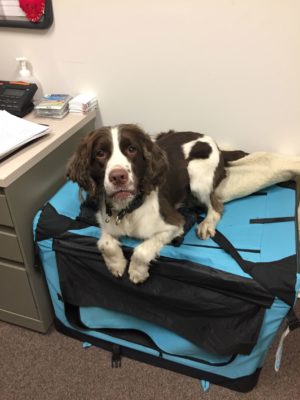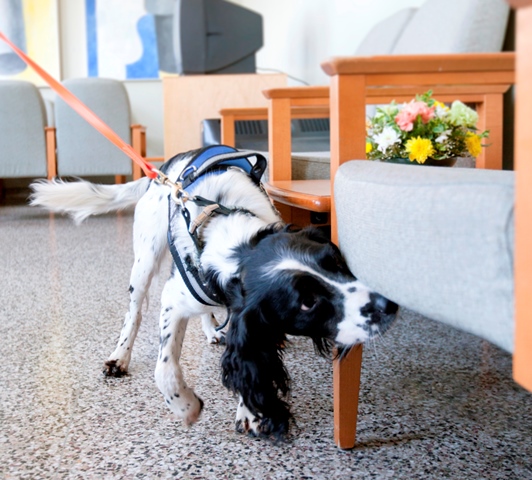Vancouver Coastal Health’s four-legged infection fighter is taking a road-trip to showcase his C. difficile detection abilities. Angus, a three-year-old English springer spaniel, and his trainer, Teresa Zurberg, will visit hospitals in the Interior of BC and in other regions of the province. Angus will use an ultra-sensitive detection device – his nose – to seek out C. difficile spores in the hospital environment. Angus will search common and clinical areas and patient units when patients are not present.
“We’re excited about the opportunity to share our knowledge and expertise with our health care colleagues across the province,” says Teresa Zurberg. “Since Angus started working at Vancouver General Hospital (VGH) in 2016, we have learned a tremendous amount about the presence and eradication of C. difficile in health care settings.”
Angus is trained to detect clostridium difficile or C. difficile, a superbug that attacks people whose immune systems have been weakened by antibiotics. He and a second dog—Dodger—are part of an infection prevention team that includes an Infection Control Practitioner and housekeeping staff, all dedicated to reducing environmental contamination of C. difficile. This results in a reduction in the transmission of C. difficile by healthcare workers, visitors and patients, and, in turn, a decrease in the C. difficile infection rate. The good news—it’s working. The nose clearly knows where to find bacteria.
Vancouver Coastal Health has recorded a significant decrease in the number of hospital acquired C. difficile cases since Angus began sniffing out C. difficile infection at VGH. (VGH). “I know how serious C. difficile can be because I nearly died from it,” says Teresa Zurberg. “To know that Angus, and now Dodger, are playing a key role in preventing other people from contracting this potentially life-altering infection is very rewarding.”

Finding reservoirs of C. difficile is crucial to eradicating the superbug. Once the bacterium is detected by Angus or Dodger at VGH, the area or patient room is cleaned, often with a state-of-the-art ultraviolet-C light disinfecting robot that removes 99.9% of the spores. VGH has three light disinfecting robots, known as “R-D” (Rapid Disinfector). Since the dogs were let out of the doghouse and into the hospital, VGH has become better at targeting the disinfection to where it is needed the most.
“In the Intensive Care Unit, we work hard to prevent the spread of infection by isolating patients, washing our hands and working with environmental services to keep the unit clean,” says Jackson Lam, Patient Services Manager, Vancouver Coastal Health. “By having Angus come through the ICU is an innovative and exciting way to discover new places that C. difficile might be lingering on surfaces. That way we can immediately target cleaning and disinfection.”
Clostridium difficile infections have decreased in Canadian hospitals
Vancouver Coastal Health has implemented a number of measures to combat the spread of antibiotic-resistant organisms and has won national and international awards for this innovative work. It was the first health authority in Canada to utilize ultraviolet light to supplement the disinfection process and the first to tag and barcode clean equipment to ensure routine inspections and maintenance are performed. VCH also participates in voluntary as well as mandatory provincial surveillance programs.
However, there is a downside to having to having two trained C. difficile detection dogs at VGH. “Everyone wants to pet Angus,” says Jackson Lam. “We have to respect that he is a working dog and not touch him, as handsome a dog that he is!
Vancouver Coastal Health is responsible for the delivery of $3.3 billion in community, hospital and residential care to more than one million people in communities including Richmond, Vancouver, the North Shore, Sunshine Coast, Sea to Sky corridor, Powell River, Bella Bella and Bella Coola. VCH also provides highly specialized care and services for people throughout BC, and is the province’s hub of health care education and research.
Carrie Stefanson is the Public Affairs Leader, Vancouver Coastal Health.


